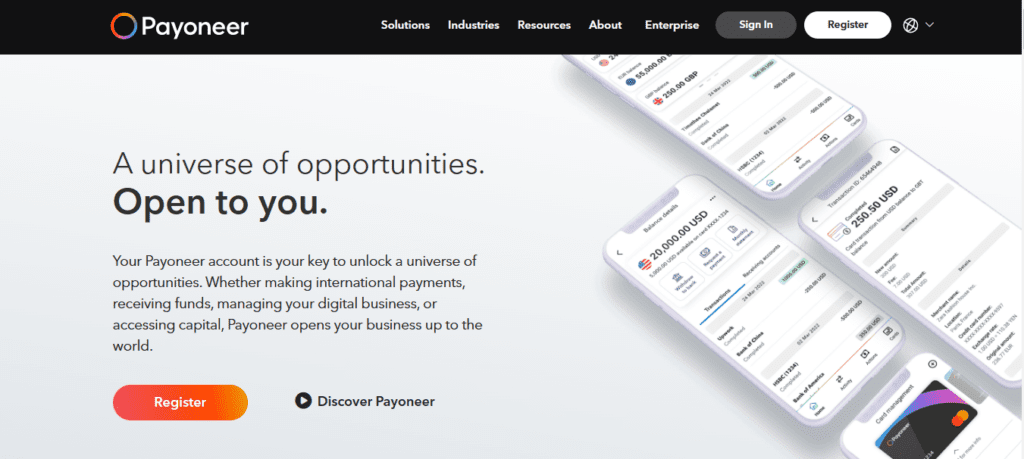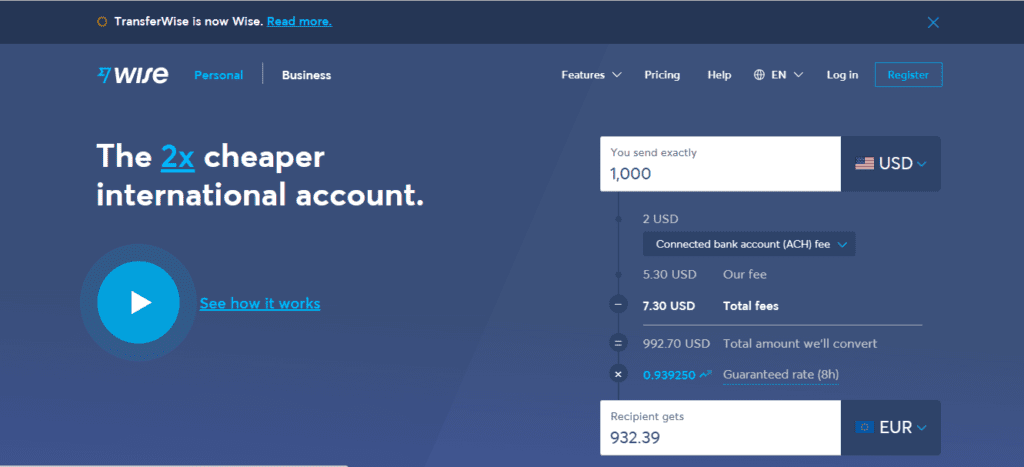Payoneer is a popular payment platform that allows businesses and freelancers to receive payments from clients worldwide. However, it’s not the only payment platform available in the market. Many Payoneer alternatives offer similar or even better features and services. In this article, we’ll explore some of the best Payoneer alternatives and highlight their key features and benefits. Whether you’re looking for a lower transaction fee, faster payment processing, or more payment options, you’ll find a payment platform that suits your needs in this list.
Top Payoneer Alternatives
Here’s a table comparing the top Payoneer alternatives:
| Payment Platform | Transaction Fees | Payment Processing Time | Payment Options | Multi-currency Support |
|---|---|---|---|---|
| TransferWise | Low | 1-2 days | Bank transfer, debit card, credit card | Yes |
| PayPal | Low | Instant | PayPal balance, bank transfer, credit card, debit card | Yes |
| Skrill | Low | Instant | Skrill balance, bank transfer, credit card, debit card | Yes |
| Stripe | Low | 2-7 days | Credit card, debit card, bank transfer | Yes |
| Payza | Low | Instant | Bank transfer, credit card, Bitcoin, Payza e-wallet | Yes |
| 2Checkout | Low | 2-3 days | Credit card, PayPal, bank transfer | Yes |
Alternatives To Payoneer For Digital Payments

There are several alternatives to Payoneer for digital payments, each with its own set of features and benefits. Here are some of the top alternatives:
- PayPal: PayPal is one of the most widely used digital payment platforms, offering easy transactions with low fees. It is accepted in over 200 countries and supports multiple currencies. PayPal also offers a variety of features such as invoicing, subscription management, and dispute resolution.
- Skrill: Skrill is a popular digital payment platform that offers a range of features such as prepaid Mastercard, money transfer, and cryptocurrency exchange. It has low transaction fees and supports multiple currencies.
- TransferWise: TransferWise offers fast and secure international money transfers at a low cost. It has a user-friendly interface and supports over 750 currency routes. TransferWise also offers a multi-currency account and a debit Mastercard.
- Stripe: Stripe is a digital payment platform for businesses that enables online payments and transactions. It offers several features such as subscription management, invoicing, and a customizable checkout. Stripe supports over 135 currencies and has a user-friendly interface.
- Payza: Payza is a global online payment platform that offers secure and affordable payment processing. It supports multiple currencies and offers a range of features such as mass payments, recurring billing, and online shopping cart integration.
- Paysera: Paysera is a digital payment platform that offers online payments, money transfers, and e-wallet services. It supports over 30 currencies and has low transaction fees. Paysera also offers a range of features such as bill payments, QR code payments, and currency exchange.
Each of these Payoneer alternatives has its own unique features and benefits, so it’s important to compare them and choose the one that best suits your specific needs.
Alternatives to Payoneer Mastercard
Here are some alternatives to Payoneer Mastercard with their key features:
- Revolut: Revolut offers a debit card with multi-currency support and low fees. It also offers a mobile app with features such as budgeting, savings, and cryptocurrency exchange.
- TransferWise: TransferWise offers a Mastercard debit card with multi-currency support and low fees. It also offers a multi-currency account and fast, secure international money transfers.
- N26: N26 offers a Mastercard debit card with a range of features such as mobile payments, real-time notifications, and savings tools. It has no foreign transaction fees and supports multiple currencies.
- Skrill: Skrill offers a prepaid Mastercard with multi-currency support and low fees. It also offers features such as money transfer and cryptocurrency exchange.
- Paysera: Paysera offers a Mastercard debit card with multi-currency support and low fees. It also offers a range of features such as bill payments, QR code payments, and currency exchange.
Each of these Payoneer Mastercard alternatives has its own unique features and benefits, so it’s important to compare them and choose the one that best suits your specific needs.
Is Transferwise Like Payoneer?
TransferWise and Payoneer are both online payment platforms that allow users to send and receive money across borders. Here are some of the pros and cons of each platform:
TransferWise:

Pros:
- Low fees: TransferWise charges lower fees than many other money transfer services.
- Transparent exchange rates: The exchange rates on TransferWise are transparent, with no hidden markups.
- Fast transfer times: Transfers on TransferWise typically take only a few hours.
- Easy to use: The TransferWise platform is user-friendly and easy to navigate.
Cons:
- Limited availability: TransferWise is not available in all countries.
- Only supports bank transfers: TransferWise does not support credit card or debit card payments.
- Limited currency options: TransferWise supports fewer currencies than some other online payment platforms.
Payoneer:
Pros:
- Multi-currency support: Payoneer supports payments in over 150 currencies.
- Global reach: Payoneer is available in over 200 countries.
- Easy to use: The Payoneer platform is user-friendly and easy to navigate.
- Supports multiple payment methods: Payoneer supports bank transfers, credit cards, and debit cards.
Cons:
- Higher fees: Payoneer charges higher fees than TransferWise for some services.
- Exchange rate markups: Payoneer may apply a markup to the exchange rate, which can result in a higher cost for users.
- Longer transfer times: Payoneer transfers can take up to several business days to process.
Overall, TransferWise and Payoneer have their own unique strengths and weaknesses. Which one is better for you depends on your specific needs and priorities. If you are looking for low fees and fast transfer times, TransferWise may be a better option. If you need support for a wide range of currencies and payment methods, Payoneer may be the better choice.
Is Skrill Better Than Payoneer?
Skrill and Payoneer are both popular online payment platforms, but they have some key differences. Here are some of the pros and cons of Skrill:
Pros:
- Wide range of supported countries: Skrill is available in over 200 countries, making it a good option for international users.
- Supports multiple payment methods: Skrill supports bank transfers, credit cards, and debit cards, as well as other local payment options in some countries.
- User-friendly platform: The Skrill platform is easy to navigate and use.
- Competitive fees: Skrill charges lower fees than some other online payment platforms, making it an affordable option for many users.
Cons:
- Limited customer support: Some Skrill users report difficulty contacting customer support when they have issues.
- Higher fees for certain services: While Skrill’s overall fees are competitive, some services, such as cryptocurrency transactions, come with higher fees.
Is Payoneer Better Than Paypal?
Payoneer and PayPal are two of the most popular online payment platforms. Here are some of the pros and cons of using PayPal:
Pros:
- Wide acceptance: PayPal is widely accepted by merchants and service providers, making it a convenient payment option for many users.
- Buyer and seller protection: PayPal offers buyer and seller protection for many transactions, which can provide peace of mind for users.
- User-friendly platform: The PayPal platform is easy to use and navigate.
- Multiple payment methods: PayPal supports multiple payment methods, including bank transfers, credit cards, and debit cards.
Cons:
- Higher fees: PayPal charges higher fees than some other online payment platforms, particularly for international transactions and currency conversions.
- Holds and freezes: PayPal may place holds or freezes on user accounts, which can be inconvenient for users.
- Security concerns: Some users have raised concerns about PayPal’s security practices and the potential for account hacking.
- Limited customer support: PayPal’s customer support can be slow and difficult to access.
Overall, Payoneer and PayPal both have their strengths and weaknesses, and the best platform for you will depend on your specific needs and preferences. PayPal may be a good option for users who value wide acceptance, buyer and seller protection, and a user-friendly platform, while Payoneer may be a better choice for users who value low fees and an easy-to-use platform. Ultimately, it’s important to carefully evaluate your options and choose the platform that best meets your needs.
Which Is Better Stripe Or Payoneer?

Stripe and Payoneer are both payment processing platforms, but with different focus areas. Here are some pros and cons of Payoneer:
Pros:
- Provides international money transfer services with competitive exchange rates
- Offers local bank accounts in various countries, which can be helpful for businesses with overseas operations
- Enables businesses to receive payments in multiple currencies
- Supports a variety of payment methods, including bank transfers, credit/debit cards, and e-wallets
- Provides a Mastercard debit card for easy access to funds
- No monthly or annual fees for account maintenance
Cons:
- Higher transaction fees than some competitors for certain payment methods, such as credit/debit cards
- Limited integration options with e-commerce platforms
- Not suitable for businesses looking for a comprehensive payment processing solution
- Limited customer support options
Overall, Payoneer is a good choice for businesses that need to receive and send international payments in multiple currencies. It is particularly useful for businesses that operate in countries where there are limited payment options. However, it may not be the best option for businesses looking for a more comprehensive payment processing solution or for those that primarily process credit/debit card transactions.
Does Payoneer Report To IRS?
Yes, Payoneer is required by law to report certain transactions to the Internal Revenue Service (IRS). Specifically, Payoneer is required to report transactions involving U.S. taxpayers that receive payments of $20,000 or more and have 200 or more transactions in a calendar year. Additionally, Payoneer is required to report certain types of income to the IRS, such as income from freelance work or self-employment.
If you are a U.S. taxpayer using Payoneer and receive payments that meet these reporting thresholds, it is important to keep accurate records and report your income on your tax return. Failure to accurately report your income can result in penalties and other legal consequences. It’s always a good idea to consult with a tax professional if you have questions about your tax obligations as a Payoneer user.
Does Payoneer Charge A Monthly Fee?
Payoneer does not charge a monthly fee to maintain an account with them. However, there are other fees associated with using Payoneer’s services, such as transaction fees, currency conversion fees, and withdrawal fees.
Transaction fees depend on the type of payment you receive and can range from 2% to 3% of the payment amount. Currency conversion fees apply when you receive payments in a currency other than the default currency of your Payoneer account and can range from 2% to 3.5% of the payment amount.
Withdrawal fees vary depending on the method of withdrawal. For example, withdrawing funds to a bank account may incur a fee of $1.50, while withdrawing funds to a Payoneer Mastercard may be subject to a fee of $2.50.
It’s important to carefully review Payoneer’s fee schedule before using their services to ensure that you understand the fees associated with your transactions. In some cases, it may be more cost-effective to use an alternative payment platform, depending on your specific needs and preferences.
FAQ
Although peer-to-peer payment apps like Venmo, Cash App, and PayPal, as well as bank account-to-bank-account systems like Zelle, are popular payment options, consumer experts caution that they do carry certain risks.
Payoneer provides several advantages, including the ability to open real, local bank accounts in major currencies such as USD, AUD, EUR, and more without requiring a visit to the United States or an SSN.
The issue is that PayPal and Payoneer are competing companies and do not work together. While Payoneer is fine linking to a PayPal account, the reverse is impossible since it prohibits it.
